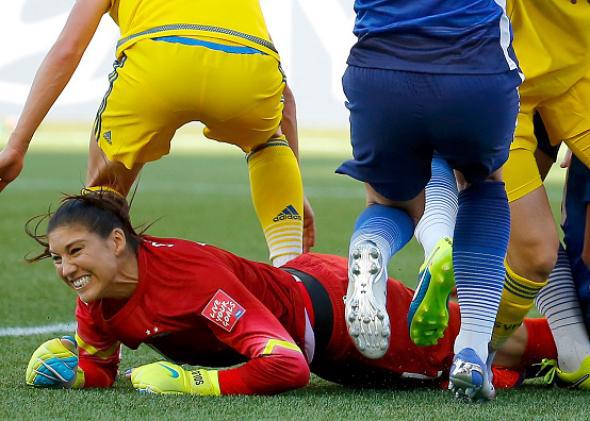In the 2015 World Cup in Canada, Group D stands for “Death.” There’s the United States, the No. 2 ranked team in the world; Sweden, the No. 5 ranked team in the world; Australia, the No. 10 ranked team in the world; and Nigeria, whose youth side came a hair’s-breadth away from winning the U-20 World Cup, losing to Germany in last year’s final in extra time.
The U.S. survived a somewhat rocky opening game against Australia, ultimately pulling away with a 3-1 victory, thanks to the heroics of Hope Solo and Megan Rapinoe. Headed into their second game of group play, the Americans had the opportunity to be the first team to book their ticket to the next round. And with a 6-0 historic record in the second game of group play at the World Cup, outscoring opponents 24-1, a betting person would have taken the Americans.
But Sweden not only beat the U.S. in the last World Cup, they are also now coached by Pia Sundhage, former boss of the U.S. team and one of the top coaches in the world. Her candid comments about her former players in the New York Times prior to Friday’s match raised eyebrows, and upped the heat in an already established rivalry. Ultimately, the Americans were only able to walk away with a 0-0 draw with the Swedes, a single point, and are still without a booked ticket to the next round. But despite the worse result, the performance was a superior one against tougher opposition than in the opening round game. It is the type of improvement the U.S. will need to continue to show if they want to win this World Cup.
In a back-and-forth, scrappy showdown, there was one shining takeaway for U.S. fans: the confidence-inspiring performance of the backline. They were a fluid, airtight unit, exhibiting a connectivity that should make American men’s coach Jurgen Klinsmann envious—snuffing out the attacks of a talented Swedish offense while controlling possession for much of the game.
The U.S. centerbacks were impressive—there was Becky Sauerbrunn, the quiet orchestrator, steady and consistent, materializing right when things looked dire, and Julie Johnston, the nerves-of-steel new kid, who has proven herself a cause for rejoicing, ridiculously smooth and in control throughout this second match.
And the outside backs were possibly better: Ali Krieger attacked constantly up the wing, sending in dangerous crosses. At the game’s crucial moment, Meghan Klingenberg, the 5-foot-2 defender, got airborne to save a sure goal off the line.
Of course, you’re never aiming to have your defenders or your goalkeeper in the spotlight. (The match against Belgium that eliminated the American men from the 2014 World Cup, where Tim Howard was forced to make 16 spectacular saves, comes to mind.) While there were sniffs of potential greatness on the offensive end—a turn by Christen Press, yet another inswinging cross from Megan Rapinoe (scorer of two American goals in the first match), a bolt forward from Sydney Leroux, a near header from Carli Lloyd, and one actually put on frame by all-time leading American scorer Abby Wambach—the U.S. ultimately looked feckless and failed to combine for truly dangerous opportunities.
A 0-0 tie was not the result the United States was looking for, but they were lucky to escape with it. In a Group of Death you need points—plural. A single point is cause for anxiety; that said, in a Group of Death, a single point can be the difference-maker.
The U.S. enters its final game of group play in the middle of the scrum—all four teams in the group are still in contention. While America’s next opponents, Nigeria, are the lowest ranked contender in the group at No. 33 in the world, they aren’t a pushover. They’ve won 9 of 11 African Championships, and they boast a talented forward line which includes Ngozi Okobi, Francisca Ordega, and Asisat Oshoala, the first African to win the u-20 Golden Ball. They came back from a 2-0 deficit and a 3-2 deficit against Sweden to tie 3-3 in the most exciting game of this World Cup, and they’re fresh off a disappointing 2-0 loss to Australia.
Nigeria is familiar with the Group of Death, having been in it alongside Sweden and the United States in both 2003 and 2007; both times, they failed to advance. Nigeria will almost certainly need all 3 points against the U.S. to change that on Tuesday, and will be battling for a win. In order to meet the expectations of being the second-ranked nation in the world and stay on track for a possible third World Cup title, the United States will want all three points themselves to guarantee a spot atop the tournament’s toughest group.
The Americans have gone through biggest test of the early rounds of the tournament against a talented and spirited Swedish team—one of the top teams in this event—but they got through with just a passing grade, having very nearly conceded twice. The form they showed on Friday would not be enough to win this World Cup. But if they continue to show the same level of improvement throughout the event that they did in game two, then they will be at the level they need to be by the time it matters.
